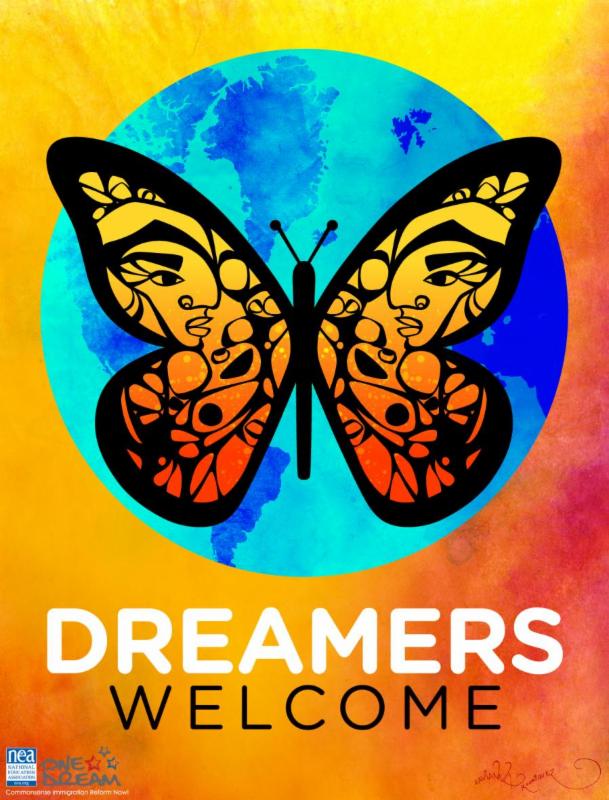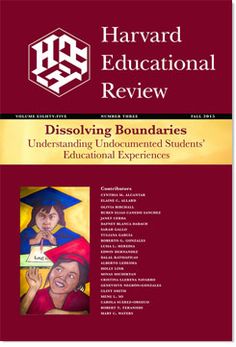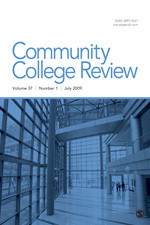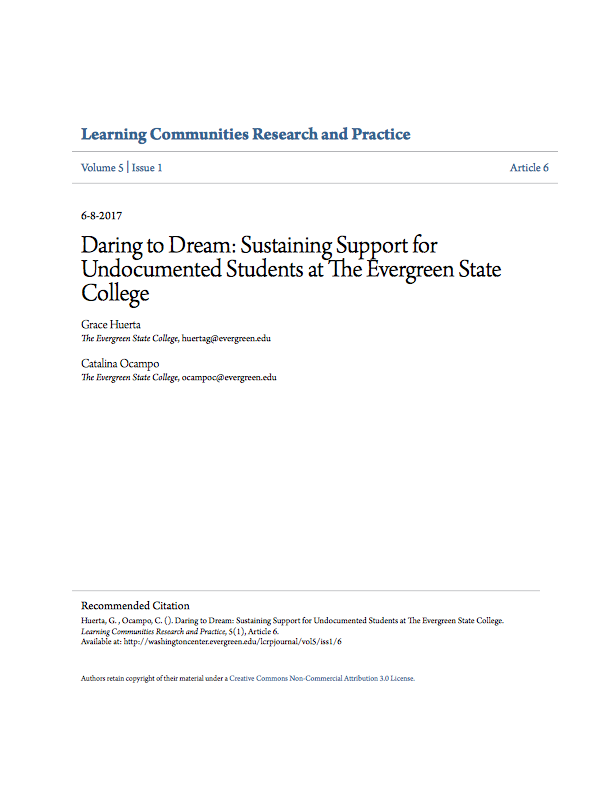September 2017:
Issue 6.1
In this Issue:
Higher Education, and Immigrant Integration
Current News & Announcements
Janet Napolitano
August 23, 2017
Huffington Post
Jessica A. York
September 1, 2017
Santa Cruz Santinel
Natalie Gross
July 13, 2017
The Atlantic
Kelan Lyons
August 11, 2017
The Eagle
Patricia Leigh Brown
February 3, 2017
The New York Times
Ron Maxey
August 13, 2017
The Commercial Appeal
Astrid Solorzano
September 5, 2017
NBC San Diego
David Jenkins
August 7, 2017
Cerritos College Talon Marks
The Hague, Netherlands
18-22 September 2017
Georgetown University Law Center, Washington, D.C.
25 September, 2017
Phoenix, Colorado
10-12 December 2017
Washington, D.C.
24-27 January, 2018
SEE PREVIOUS ISSUES
|
|
|
 COMMENTARY COMMENTARY
New Americans go to College...
Dr. Westy Egmont
The rescinding of DACA has hit the immigrant community and many campuses like a tsunami. While creating legislation demands central attention for the 800,000 registered 'Dreamers' (of the 1.2 million eligible) the needs of foreign-born students are multi-dimensional. In this issue, we focus on those pursuing higher education. In the United States, immigrants have just 2% lower levels of college education than the native born, 29.4 vs 31.4%. The second generation well outperform native born Americans with 36% college education vs. the native 31.4%. These statistics are evidence of the high value placed on education within many foreign-born families across the country. Focus on the dropout rate of 28%, while vital, often leaves the escalator of higher education for immigrant youth with scant attention and very few campuses have a concerted effort to adequately address this particular minority of students.
What role does the university play in the attainment of a degree? Beyond the obvious provisions offered all students, immigrants like those who are native born and the first college attendees in their family, need supportive services.
Having a 'big brother' made it possible to survive those first months. I had no clue how to access the resources at our school. It was a program of the center but it was just Henry being there for me.
In a report entitled
What Makes Acculturation Successful
, authors Guarnaccia, Giliberti, Hausmann-Stabile, Martinez, based on original field interviews, students point to family and community support as key success factors and acknowledge the role of specific programs prior to, upon entering, and while at the university that helped them attain their goal of higher education. Intervention is powerful.
First Year Scholars at Yale
begins with a five-week summer program aimed at creating bonding time, discovering the resources of the university, and providing a university credit English class. Thirty four individuals were in the first cohort that has grown each year to the current 60. FYS was deemed 'instantly successful,' praised by students and academics alike.
My life matters, and I needed this weekend to affirm all I am, a Latina women and proud of my color, my bilingual skills, my heritage, my family and my place as an American.
The Bowman AHANA and Multicultural Center
at Boston College is a positive example of bridge programs that focus on all minorities. The gamut of programs includes an optional summer immersion before the first year, mentors, overseas experiences, counseling services, and retreats, all of which are complemented by active cultural competency education for the campus and efforts to address inequities and power dynamics impacting minority students. Brandeis University has a full transition year program (TYP), which guarantees small classes, rigorous academics, and strong academic support for the 20 accepted students each year. 90% graduate, averaging four and a half years of study.
Heading to medical school still feels amazing. Even after the first semester or two at college, I had a home on campus where it felt ok to be me.
Missing the Need
Beyond adjustment to the academic demands, foreign-born students often face a variety of other issues. As the DACA moment illuminated vibrantly, there are concerns about legal status for many, for their family members at risk, for the immigration consequences of behavior for all LPRs (legal permanent residents), the processing of discriminatory behaviors, and the absence of family understanding. Additionally, many students encounter increased financial stressors, difficulties obtaining work authorization, inexperience with cultural expectations and confusing mores, and often challenging attempts to find role models or pathways. Acculturative stress is seldom recognized, and needed code shifting comes with complexities of identity formation and self-confidence. Language also remains a central issue as Inez Manturana Sendoya of BC notes: "
I find that ELL students at BC need more support to improve their English language skills through more extensive tutoring and more faculty who are trained to work with those students." There is often the desire to advance in fluency in both the native tongue and the second language so as to be effective within their root culture as well as the adopted culture.
Personally, not a week passes without students visiting my office to discuss issues ranging from careers to getting a family member a visa to visit, from early marriage to secure status (Green Card) to family pressure to work now and help support others. USCIS/ DHS is in the conscious life of hundreds of thousands of students, and related issues demand attention.
Pima Community College in Tucson recognizes that school is but one stop on the migration trail, a trail that begins long before coming and lasts a lifetime.
Transition to Jobs
,
a 10-week non-credit course taught by volunteer teachers, recognizes the value of support and understanding, addresses US credentials and the processes that lead to employment. Many adult students bring prior education and experience and need assistance in recertification or discovery of alternative career options. Community colleges play an outsized role as the front line in higher education within the immigrant community, and unlike state and private universities, they are more likely to have identified immigrant students and developed some special programs.
Pre-admission is a critical period. "
The recommended high school counselor-to-student ratio is 1:250, but in California schools, the average college counselor has a caseload of up to 800 students. As a result, nearly 60 percent of low-income students who qualify academically for highly selective colleges and universities will not attend. "They either enroll in a less selective school or forgo college altogether," said William Tierney, a professor at USC Rossier. The challenges of even discovering the options, addressing the barriers, and completing the process, are major hindrances. USC does offer high school graduates intense summer prep programs in SummerTIME, a program of intensive writing, study skills and college knowledge workshops on the USC campus to improve the chances of success. Such efforts rest on foundation support-seldom having secure financing.
The College Bridge Program
is one of the model efforts to address pre-matriculation barriers with a well-developed engagement strategy.
Early Academic Outreach
in Arizona is another fine example of community engagement to help prepare underrepresented populations enter the university.
Should one get into college, students face their lack of cultural preparedness and the vexing issues of acculturation far more than native born classmates. The issues of race, class, language, ethnicity and legal status compound acceptance and integration.
The general absence of institutional recognition, accommodation and provision as distinct university programs is notable. There is scant peer reviewed research. Some immigrant students are regularly found in transitional programs, but dedicated immigrant focused programs are absent. The University of Arizona is the exception with an
Immigrant Student Resource Center
offering help in everything from naturalization to scholarships. California state universities have a DACA resource on each campus. These are positive steps inviting creative replication appropriate to varied contexts.
While the Association of American Colleges and Universities asks in its theme this year: "Can Higher Education Recapture the Elusive American Dream?" it is clear that a generation of students - 20% foreign born and 25% having a foreign-born parent -are coming. They are dreamers. They see education as hope and the question remains, will the school that accepts them, serve them.
BCSSW, Immigrant Integration Lab
|
|
|
|
 AGENCY FOCUS
AGENCY FOCUS

The Immigrant Student Resource Center (ISRC) is a branch of the UA Early Academic Outreach office at the University of Arizona. An integral part of the university's student outreach services, ISRC works to recruit and retain students of immigrant and refugee backgrounds at the UA. ISRC provides numerous services to students, including individuals with DACA status, undocumented and unauthorized students, as well as students belonging to mixed-status families and from refugee backgrounds. The office works to provide comprehensive services to all of their students, as well as providing trainings to UA professors, staff, and administrators on how to work effectively with these students.
ISRC provides a number of
trainings to UA faculty, administrators, and staff regarding developing the skills and the knowledge base needed to work with immigrant students and their families. The Wildcats UndocuPeers Training Sessions is one example of a training lead by the ISRC office, informing staff and administrators of the UA community on the needs of the undocumented student body. The ISRC office also provides a detailed webpage with resources for immigrant and refugee students alike. Through providing information about Know your Rights campaigns through PDF files and promoting community organized events, the ISRC office aims to provide comprehensive services and support to their students from immigrant and refugee backgrounds. Through their partnerships with Refugee Focus and other refugee programs in Arizona, ISRC provides information and combined efforts towards helping refugees resettle and find housing, as well as helping refugees find employment and learn American culture. Their webpage additionally provides information on U.S. Citizenship, and their office provides social, legal, academic, and career advice to students.
The Undocumented Student Program (U.C. Berkeley)
The Undocumented Student Program
(USP) at the University of California at Berkeley provides undocumented undergraduate students with guidance and support. Their solution-focused approach offers individualized services for each student, including academic counseling, legal support, financial aid resources and campus referrals. With the desire for their students to feel a sense of belonging, the USP honors their talents they bring to the university. Moreover, the USP collaborates with the Staff Diversity Initiatives to create specialized institutional support for undocumented students. This includes trainings and curriculum for not only students, but also faculty and staff. Overall, the university hopes this program will promote the health and wellbeing of their undocumented student community.
Dr. Kathryn W. Davis Global Education Center (Palm Beach State College, FL)
The Dr. Kathryn W. Davis Global Education Center
at Palm Beach State College in Lake Worth, FL works to increase access to higher education for immigrant students while also addressing their social, political and economic needs, regardless of their immigration status. They provide financial aid, peer mentorships, and English language services. Additionally, they offer free integration workshops for their students to learn more about U.S. culture, with topics ranging from "Immigration and Legal Issues" to "American History and Political System."
The Community College Consortium for Immigrant Education (CCCIE)
is a national network of community colleges across the United States, which promotes the education and advancement of immigrant students. With innovative programs and services, the CCCIE helps immigrant students address the opportunities and challenges they face within the higher education system. To do this, they offer their partners a database of programs and initiatives, including support services,
ESL programs
,
workforce training and career development
,
citizenship preparation
,
community and employer partnerships
, and
inclusive practices for undocumented students
. CCCIE is committed to improving academic, workforce, and societal outcomes for the immigrant and refugee populations they serve.
|
 CURRENT RESEARCH
CURRENT RESEARCH
|
|
 |
Suárez-Orozco, C., Katsiaficas, D., Birchall, O., Alcantar, C. M., Hernandez, E., Garcia, Y., Michikyan, M., Cerda J., & Teranishi, R. T. (2015).
Harvard Educational Review, 85(3), pp. 427-463
Undocumented students face a host of challenges in attending and completing college, including lack of social support from their college campuses and fellow students. In this study, surveys were completed by over 900 undocumented college students attending 264 higher education institutions in the US (88.7% of participants were Latinx and 33 different primary languages were represented). The participants offered numerous recommendations for creating 'undocufriendly' campuses, suggesting actions that campus staff and administrators can take. The first step is to build "a broad foundation of understanding." Among campus staff and faculty, including training on how to tailor college services to undocumented students and providing 'ally training' for fellow students. Concrete supports are also needed, including financial aid, culturally-sensitive counseling, and informed academic and career advising. Additionally, colleges can promote key social supports, including the creation of physical 'safe spaces' for undocumented students and designating visible, active 'undocuallies' (faculty, staff, and fellow students) to support students' academic and personal growth. All of these steps encourage a campus climate of respect for undocumented students and their experiences.
|
 |
Tovar, E. (2015).
Community College Review, 43(1), pp. 46-71
Community colleges serve as the primary point of entry into higher education for more than 50% of all Latinx college students, including those studying to earn certificates or associate's degrees as well as those hoping to transfer to four-year institutions. This study utilized a sample of Latinx community college students in California (75% of whom were first-generation students). The results demonstrated that participation in student support programs had a small but significant impact on both a student's academic success as well as their intent to pursue degree completion. Support programs can help provide academic and career information, but assistance must move beyond academics to be beneficial. Attention to the psychosocial needs of first-generation Latinx students is crucial, and the author suggests that college administrators ensure that the staff of counseling and advising programs are trained in the unique barriers that first-generation Latinx students experience in completing college programs. Support programs should also develop ongoing 'orientation' programs for parents, partners, and other key family members of students, with the goal of boosting the significant positive impact that a supportive social network can have on a Latinx student's intent to complete their degree program.
|
 |
Huerta, G., & Ocampo, C. (2017)
Learning Communities Research and Practice, 5(1), p. 6
The election of President Donald Trump has heightened fears among undocumented immigrants. While Plyler v. Doe protects students at the K-12 level, accessibility and resources for undocumented students wishing to pursue higher education are limited. Student organizers across the country have been demanding higher education institutions to declare their position as sanctuary campuses. Such a designation entails that the university will protect its undocumented immigrants through refusing cooperation with ICE agents and allocating funds to support undocumented students. The Evergreen State College (TESC) located in Washington State, is one of the few states in the nation that provides in-state tuition and state-funded financial aid to undocumented students. Various student, faculty, and staff coalitions at TESC drafted a petition to encourage the university to designate itself as a sanctuary campus. The university president declared TESC a sanctuary campus and established institutional services such as university-wide training on supporting undocumented students, revising of application materials, creating an Undocumented Student Task Force, support group, and funding a Student Retention Program (SRP) to ensure the academic success of undocumented students. Despite its notable success, funding and support to sustain these programs are needed.
|

|
Sanchez, R.E.C., & So, M.L. (2015)
Harvard Educational Review, 85(3), pp. 464-477
The Undocumented Students Program (USP) established in 2012 at the University of California Berkeley was the first program at a U.S. university designed to support undocumented college students. The USP provides academic support, legal services, financial aid resources, and outside referrals. The USP operates on a "personal, holistic, multi-identity, and solution-focused service model." The program provides several workshops and trainings including the UndocuAlly Training Program that educates students, faculty, and staff in learning best practices of supporting undocumented students and their college experience. In providing nation-wide training and presentations, USP is aware that other allies of undocumented students who want to implement similar programs have encountered multiple barriers in their institutions. Through research, education, conversations, and forging allies with various key figures and institutions, USP was created. In spite of multiple obstacles faced by undocumented students, USP is committed to continue supporting undocumented students and providing them the resources they need to afford and graduate from college.
Soria, K., & Stebelton, M. (2013)
The Learning Assistance Review 18(1), pp. 7-24
Academic self-efficacy refers to "students' confidence in their ability to undertake academic tasks". Research has shown that a college student's beliefs of their own academic self-efficacy highly predicts their academic performance and persistence in their academic program. Increased academic self-efficacy can also positively impact how a student responds to adversity and copes with the demands of a college education. This study examined data from 18,315 immigrant students enrolled at six large public research universities in the U.S, finding that immigrant students were significantly more likely than their non-immigrant peers to perceive certain obstacles to academic achievement. These obstacles included family responsibilities, study skills, study behaviors, weak English and math skills, and mental health concerns. The authors suggest a few steps that higher education professionals, including faculty and staff, can take to help increase immigrant students' academic self-efficacy (and thus, their ability to persevere and overcome their obstacles). Professionals can encourage immigrant students to seek out conducive study environments and ensure that appropriate resources are available on campus, such as study skills courses or ongoing workshops focusing on developing study habits. Additionally, professionals should initiate honest conversations with all students, especially immigrants, of the availability of mental health resources on campus and the importance of seeking help. This could include supporting immigrant students to obtain support wherever they are comfortable, including in their community or through religious institutions. Finally, faculty also have an important role to play in supporting immigrant students, as faculty-student contact is one of the strongest predictors of increased academic self-efficacy and motivation for college students.
|
|
 REVIEWS REVIEWS
Undocumented and in college: Students and institutions in a climate o national hostility
By Jones, T., & Nichols, L
Fordham University Press (2017)
Undocumented and in College follows a two-year study of undocumented students entering onto the pathway of higher education, specifically in the context of Jesuit institutions. Edited by two professors of sociology, Terry-Ann Jones, Ph.D. and Laura Nichols, Ph.D, the book concentrates largely on student interview feedback while also capturing insights into the knowledge and attitudes among faculty and staff towards these students. This book crosses the disciplines of policy, theory and history, religion, law, and education to provide a historical and present-day context of immigration. Professor Jones' and Professor Nichols' findings run contrary to the dominant narrative, citing a positive response to undocumented student populations in Jesuit institutions.
Authors Jones and Nichols portray positively the contributions of Jesuit institutions of higher education in helping undocumented students achieve their aspirations. They began by introducing the theme and providing a theoretical and conceptual framework for the study. Their authorship continues to describe the intersections of immigration, Jesuit higher education, and being undocumented; how to become an ally in breaking down barriers; and finally to unpack the moral framework, firsthand experiences, and institutional practices of a Jesuit education.
First-generation college students: Understanding and improving the experience from recruitment to commencement
By Ward, L., Siegel, Michael J., & Davenport, Z.
Jossey-Bass (2012)
First Generation College Students
provides a thorough overview on who first-generation students are, their context of origin, and means of preparation for higher education. It further documents their journeys into accessing college, connecting in the classroom, and continuing through to degree completion. Authors Ward, Siegel, and Zebulun discuss effective student retention practices and a transformed, holistic perspective on working alongside first-generation students toward success.
Ward, Siegel, and Davenport's writing strengths lie in addressing not only who undocumented students are and the barriers they face; they also deliver examples and opportunities of what should be done in policy, programs, and practice to aid and ensure the success of students, regardless of status.
We are Americans: Undocumented students pursuing the American dream
By Perez, W.
Stylus Publishing (2009)
Winner of the
CEP Mildred Garcia Award for Exemplary Scholarship.
In a nation where the dominant narrative toward the undocumented questions their legitimacy to integrate into society, We are Americans follows twenty undocumented individuals through varying degrees of higher education: high school, community college, university, and graduate school. Professor Perez centers upon the stories of undocumented individuals to provide compelling evidence of their educational successes and further contributions to society, recognizing also the role and response of educational programming.
Furthermore, Perez weaves into the students' stories thoughtful suggestions for social and policy issues of immigration reform. He challenges readers to consider how much greater the contributions of the undocumented would be if we simply provided a reasonable path of opportunity.
|
_______________________________________________________________________________________________________
RESOURCES
Community College Consortium for Immigrant Education (2011)
This summary provides a community-wide analysis of needs and barriers to increasing opportunities for immigrant students, as well as presenting a detailed look at key success factors and promising practices of current programs.
Excelencia in Education (2016)
This yearly publication focuses on programs aimed at supporting Latinos in their search for higher education, and recognizes selected programs in higher education at the Associate, Baccalaureate, & Graduate levels, as well as Community-Based Organizations (CBOs)
World Education Services (2017)
WES is a non-profit organization that evaluates international/immigrant students' domestic educational qualifications. WES also designs a number of
events
that assist international/immigrant students in their academic/career pursuit. Their Global Talent Bridge program, Bridging the Gap for Foreign-Educated Immigrants provides a comprehensive guide for immigrant students looking to pursue community college options for their future.
Rutgers Student Experience (2013)
This report was initially conducted by Rutgers University in 2013. The report discusses issues about immigrant students' acculturation process and factors that help them succeed.
The University of North Carolina at Chapel Hill
United States Committee for Refugees and Immigrants (2007)
NC SLI is a college preparatory program designed for assisting Latino and Hispanic high school students in the North Carolina public school system, surrounding the University North Carolina at Chapel Hill. It has diverse programs and events designed to assist Latino high schoolers, college Latino Leaders, and those who are first generation college students.
United We Dream
United We Dream is the largest immigrant youth-led organization in the United States. It has a number of programs and comprehensive online resources that assists immigrants. Its program the
DREAM Educational Empowerment Program
is specifically designed to empower immigrant students and their families' educational challenges.
New York Immigration Coalition
A comprehensive handbook, this guide allows parents, educators, and students alike to find current information regarding attending college, finding financial aid, and looking for resources as an immigrant college student. Available in English, Spanish, and four other languages.
DACA RESOURCES
Migration Policy Institute (2017)
This brief provides an overview of the current state of DACA as of August, 2017, as well as a summary of the educational attainment, labor force participation, and occupational distribution of the DACA-eligible population.
Migration Policy Institute (2017)
This fact sheet discusses an overview of DACA, as well as providing an array of data and charts representing the potential impact of legislative scenarios on the unauthorized youth in the U.S.
United We Dream
The largest immigrant youth-led organization across the U.S. Made up of 100,000 youth and allies, including over 55 affiliate organizations in over 26 states. Action network taking donations and leading protests around the country.
You Caring: Compassionate Crowdfunding (2017)
One of many websites where individuals can contribute towards the financial needs of DACA recipients.
Mission Asset Fund (2017)
Matched by a grant from the Mexican Consulate, the Lending Circles for Deferred Action group lends money to DACA recipients to renew their application, supported by the matching grant from the Mexican Consulate of San Francisco.
|
Follow Professor Egmont on
Twitter @wegmont
|
EDITORS: F. Crutchfield-Stoker (Managing Editor), W. Egmont, A. Spratley, D. Lee, A. Mooney, J. Slicer, Y. Shi, & D. Maglalang
|
|
|
|
|